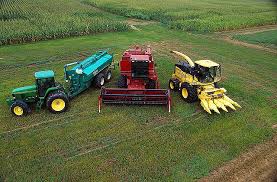Education programmes of job
Mechanical Designing Engineering Mechanical Power Engineering
Automotive engineering

Nature of work
An agricultural mechanic is responsible for fixing tractors, combines and other farming implements. Often, mechanic uses specialized skills and experience to locate and diagnose the machine's problem effectively and at less cost. In this endeavor, an agricultural mechanic may use computer aided systems to help troubleshooting and even repair the faulty part or parts. This position might include tasks ranging from working on an engine's electrical system or carburetor to welding cracked pipe fittings. An agriculture mechanic uses tools such as electronic diagnosing programs to diagnose and then fix problems in a machine's systems. He/she performs, repairs, services and maintains agricultural machinery. Instead of working on cars and motorbikes this mechanic specializes in working on farming machinery. The work involves a lot of problem solving, working with tools and mechanical equipment. A lot of the work would be outdoors, working on site with the farmer in his yard or field. Some Agricultural mechanics have their own workshop located in the country where their experiences are required. Environment of work
An agricultural mechanic spends time at various worksites; both indoors and outdoors, travel to agricultural settings to see that equipment and machinery are functioning according to the manufacturers. Other workplaces where he/she is employed include research and development laboratories, classrooms, and offices. An agricultural engineer typically works full time. And because of the nature of agricultural projects, he/she must sometimes work overtime. In addition, the supervision duties of an agricultural engineer mean that he/she often must be ready for problems that may come up in manufacturing operations or rural construction projects. Weather also has a role in his/her work schedule. Some outdoor projects for environmental reclamation or pollution management need favorable weather; and, therefore, an agricultural engineer may work long hours to take advantage of good weather. Professional life
Opportunities arise from time-to-time for promotion to supervisor level. Many people use an apprenticeship as a first step in proceeding to such positions as instructors, teachers, training advisers, managers and owners of businesses. Apprentices and craftspeople that have the necessary ability, initiative and basic qualifications, can find opportunities available for their advancement. These include advanced technological and management courses which are available in institutes of technology, schools of management, professional institutes etc. People seek to improve themselves in their careers are advised to discover for themselves what opportunities are available.Range of typical starting salaries: 48000 SYP.
Getting the job
There are a few requirements for prospective agricultural mechanic entering the industry. Educationally, only a high school diploma is required for the majority of positions. Students should take physics, mathematics, and car repair courses while in high school to help facilitate transitioning into a job environment. Some high schools even offer cooperative education courses for gaining on-the-job experience. A few positions that work with heavy machinery, such as tractors and combines, may require completion of college program. These technical programs vary depending on what type of machine is involved. Automotive courses in diesel engine repair and heavy equipment systems are possible appropriate post-secondary paths for agricultural mechanic. Skills
There are many skills an agriculture mechanic needs to have and tries to improve; such as:Installation: Installing equipment, machines, wiring, or programs to meet specifications.
Equipment Maintenance: Performing routine maintenance on equipment and determining when and what kind of maintenance is needed.
Repairing: Repairing machines or systems using the needed tools.
Troubleshooting: Determining causes of operating errors and deciding what to do about it.
Quality Control Analysis: Conducting tests and inspections of products, services, or processes to evaluate quality or performance.
Control Precision: The ability to adjust quickly and repeatedly the controls of a machine or a vehicle to exact positions.
Multi limb Coordination: The ability to coordinate two or more limbs while sitting, standing, or lying down.
Hearing Sensitivity: The ability to detect or tell the differences between sounds that vary in pitch and loudness.
Information Ordering: The ability to arrange things or actions in a certain order or pattern according to a specific rule or set of rules.
Problem Sensitivity: The ability to tell when something is wrong or is likely to go wrong. It does not involve solving the problem, only recognizing it.
Sources and references
If you need any further information on what is included in this file, you can visit the following websites:· The Order of Syrian engineers, Damascus, Tel: 6627256
· www.arab-eng.org, Arab Engineers Forum.
· Arab Standard Classification of Occupations, 2008, Ed. Arab Labor Organization.
